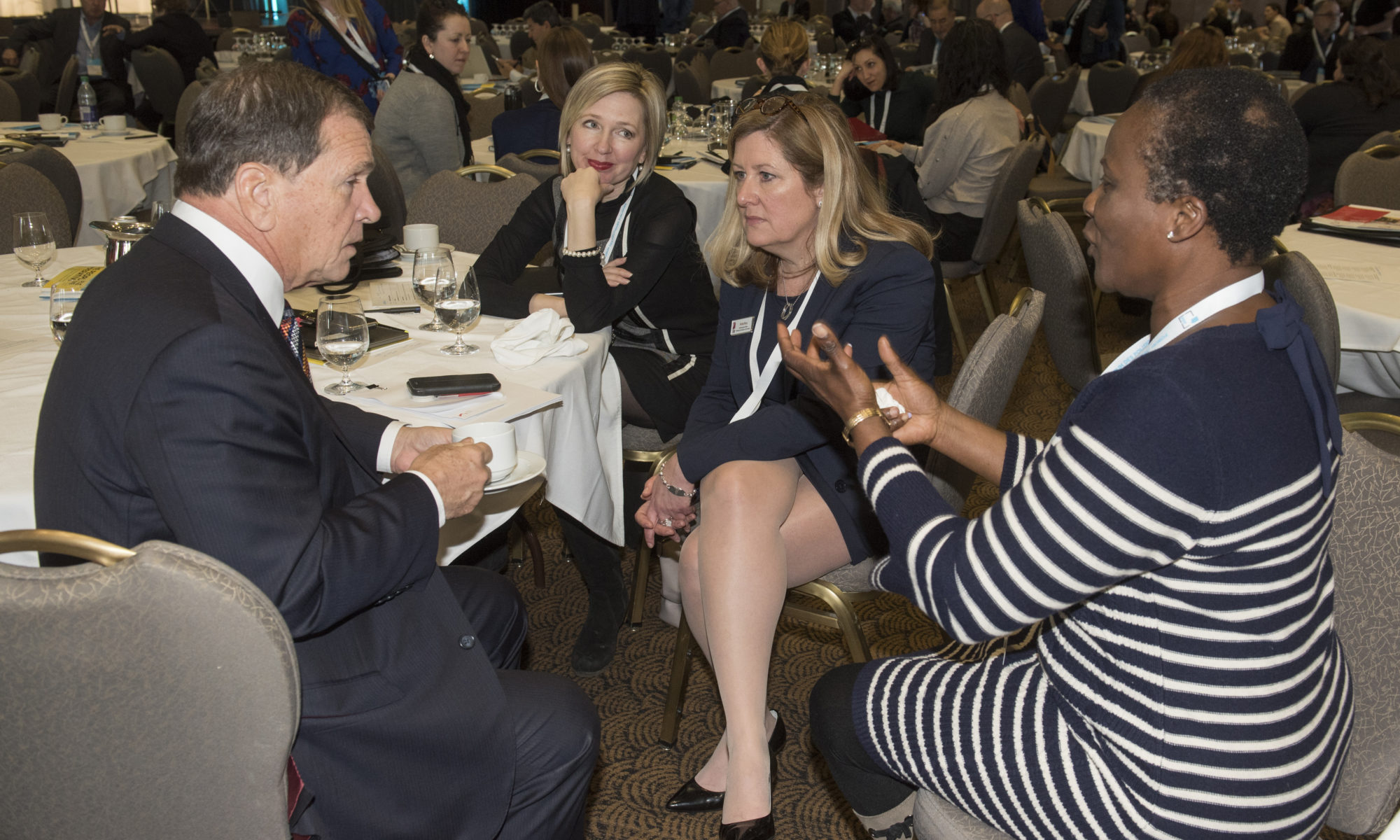
PPF Atlantic Summit 2018
Immigration, Citizenship and Refugees Canada
Innovation, Science and Economic Development Canada
NATIONAL PR
The Council of Atlantic Premiers
Porter Airlines
About the Project/ Au sujet du projet
The Public Policy Forum’s 2018 Atlantic Summit is the first major initiative in a 3-year project. From 2018-2020 we will conduct research, engage communities and decision makers, and work to support the momentum building behind the Atlantic Growth Strategy. The focus of our first year has been on demographics and the role of immigration as one approach to attract, and keep, the talented people who make Atlantic Canada home. In the coming year we will focus on the nuanced contextual issues confronting rural communities as well as Francophone immigration. We will also expand our engagement with employers and look at a skills agenda. Thank you for joining us in Fredericton today. We hope you make some new connections and leave with a renewed commitment to working together to make Atlantic Canada a great place to call home.
Le Sommet de l’Atlantique 2018 du Forum des politiques publiques est la première initiative majeure dans un projet de trois ans. De 2018 à 2020, nous mènerons des recherches, nous mobiliserons les collectivités et les décideurs, et nous travaillerons à soutenir l’élan suscité par la Stratégie de croissance pour l’Atlantique. En cette première année, notre attention s’est portée sur la démographie et le rôle de l’immigration comme l’une des approches pour motiver des individus de talent à s’installer au Canada atlantique et à y rester. Au cours de la prochaine année, nous nous concentrerons sur les enjeux contextuels nuancés auxquels sont confrontées les collectivités rurales, ainsi que sur l’immigration francophone. Nous élargirons également notre engagement auprès des employeurs et examinerons un programme de compétences. Merci d’être avec nous à Fredericton aujourd’hui. Nous espérons que vous nouerez de nouveaux liens et que vous repartirez avec un engagement renouvelé à travailler ensemble pour faire du Canada atlantique un endroit des plus accueillants.
Representatives of business, government, immigration settlement agencies, regional bodies and others gathered in Fredericton on March 21, 2018 to discuss the pressing importance of immigration for Atlantic Canada. Through presentations, keynotes, interviews and panels, speakers summarized the demographic issues the region confronts and illustrated current successes and promising ways forward to improve newcomer retention. This report summarizes the discussion and some important takeaways.
The day’s proceedings can be viewed on PPF’s YouTube channel and by following the link below:
The People Imperative
The demographic challenge confronting Atlantic Canada isn’t new. Frank McKenna framed the day by quoting a 1995 Speech from the Throne that spoke of a need for action and he recalled how a committee was struck and a report written, but not much else. The arc of conversation through the remainder of the day, however, showed how this time might be different – and why we can feel hope that positive change is afoot.
Still, Atlantic Canada doesn’t get its fair share of immigrants, and doesn’t keep its fair share either. Without this changing, and without a significant bump in economic growth, the slow motion demographic train wreck in Atlantic Canada will spiral into something worse.
‘Immigrants go where immigrants are. Immigrants stay where immigrants are’ – Hon. Frank McKenna
Mr. McKenna stated that the federal government has made Atlantic immigration a priority for a simple reason: national leadership sees the region as a demographic canary in the coal mine. Many other parts of Canada will eventually face the same issue of declining population bases, but lessons learned in the Atlantic region can be exported elsewhere in the country.
A video greeting by Minister Ahmed Hussen of Immigration, Refugees and Citizenship Canada underlined the commitment of the federal government to attracting more newcomers in Atlantic Canada. He sees immigration as important for a growing population and economy, greater innovation, new ideas, companies and jobs, and more support for public healthcare and other programs.
It’s contingent upon the region to work together to make immigration a part of successful revitalization. Francis McGuire, president and CEO of the Atlantic Canada Opportunities Agency (ACOA), stated that this is about more than jobs – it’s about changing attitudes. And today he is seeing a change in attitudes where the private sector, as well as ACOA, is rapidly embracing the importance of immigration for business success.
Growing capital, growing economies
Dr. Herb Emery explained the dichotomy of economic growth and population growth. Economic research shows that population growth alone is not sufficient for kick starting an economy, especially a small and open economy such as the Atlantic region. Immigration needs to be part of a suite of policy approaches and is not a standalone solution.
Francis McGuire translated this research on the need for capital investment into the tangible experience that businesses face as they struggle to compete and grow. Today, the number one problem he hears from business owners is that they can’t find people. Without workers they can’t meet targets let alone grow. So they face two options: find workers someplace new, or find the capital to invest in more productive technology. Fifty percent of ACOA’s budget, and soon it will be 70 percent, is helping businesses buy robots, invest in analytics and hire people who have the skills to work with new technology and data.
And yet ACOA had never worked with immigration before because they didn’t need to. Today, the organization is in a role to help entrepreneurs access the capital to modernize, and tap into labour markets – including overseas – to find the types of skilled workers that they need. The Atlantic Immigration Pilot will help meet labour market needs and spur economic growth. It should also make it easier for employers to hire international student graduates from regional universities and colleges. As more newcomers arrive in Atlantic Canada the priority becomes figuring out how to ensure they stay for the long run.
Pathways in and barriers to staying
Kelly Toughill presented the results of her journalistic work across the region, and quizzed participants on some common myths about how newcomers do in Atlantic Canada. Some of the important pieces that stick out from the literature include:
- Immigrants in Atlantic Canada have better economic outcomes than immigrants elsewhere in Canada and in some cases than native-born Canadians
- Family class immigrants also do comparatively well in Atlantic Canada
This raises the question – if immigrants do comparatively better in Atlantic Canada than in the rest of Canada, why is this commonly held to be the primary determinant for why more newcomers don’t stay in the region?
Esti Barlevy, an immigrant from Israel and web designer, told the story of why she and her family chose to stay in New Brunswick. It wasn’t an easy decision to leave Israel but she and her husband eventually agreed that their children would have the best chance to succeed in Canada. One reason they chose Saint John was that friends of theirs had moved to New Brunswick several years earlier. Once there, they ended up not knowing anyone, but Esti was pleasantly shocked by the welcoming nature of people in her new community.
The welcome, however, isn’t always as straight forward as it could be when it comes to navigating immigration. Including all the Atlantic provinces immigration streams, there are over 20 different ways that newcomers can immigrate to the region. But there is no single, web-based repository of those options which is confusing for possible newcomers such as internationals students.
The New Brunswick Economic Immigration Lab serves as an example of highly innovative problem solving and silo-busting. Amanda Hachey presented on what the lab did in the fall of 2017, and how a team of talented facilitators – with the support of senior leadership from the province, ACOA, business groups, the multi-cultural council and other key stakeholders – convened and worked with diverse participants representing many perspectives and priorities. Thirty-four participants from the settlement sector, academia, government, private sector and newcomers worked to answer two big questions:
- How do we help newcomers find meaningful work and feel part of the New Brunswick community?
- How do we help employers find the talent that they need to grow their businesses?
“There were a lot of newcomers at the table for these labs. The passion that they brought was inspiring not just for the New Brunswickers, but also helped them feel engaged in the process.” = Amanda Hachey, Director of NouLAB
The lab work identified where the system was working well and where the barriers were for newcomers and employers. Issues they identified included:
- Employers are largely unaware of the benefits of hiring newcomers, and the process to hire them.
- There’s a mismatch on the ground between newcomers who are looking for work and employers looking for talent.
- The integration of a newcomer’s spouse and family is challenging.
- Newcomer entrepreneurs don’t necessarily understand the entrepreneur culture in New Brunswick and don’t have a voice.
- The Government of New Brunswick, as an employer, doesn’t have a lot of immigrant role models.
- International students, especially Francophones, don’t often understand what is necessary to immigrate until their last year.
- More is needed to keep on building welcoming communities in New Brunswick.
Di Luckshnie and Heather Keats participated in the lab and spoke to how important it is to see immigration as a people issue. While there are processes in the system, it fundamentally comes down to committing to being a leader and demonstrating commitment to making the system work for people.
This sentiment was echoed by Marta Morgan, Deputy Minister of Immigration, Refugees and Citizenship Canada. Ms Morgan said that there are multiple reasons why people come to Canada and why they stay, and all of them involve human connection. The federal streams of entry are meant to facilitate entry that builds on connectedness. For IRCC, success in immigration strategies in the region will be to see employer demand overflows, new pathways forged and the foundations for human connection built.
Toward long-term integration
Early in the day, Francis McGuire shared how part of the needed shift is about changing the attitudes of entrepreneurs and business owners. Many of them have never travelled outside of North America before, but now need to consider how to recruit people from countries such as Ukraine and the Philippines. Government, and staff within ACOA, can help take these first steps. A panel of people from across the region who work directly in the settlement and multicultural sectors expanded on this.
Alex LeBlanc, Angelique Reddy-Kalala, Justin Campbell and Nancy Clement reiterated how successful immigration retention is fundamentally human. They see a glass wall of sorts in Atlantic Canada where not having an existing network makes life challenging for newcomers. People in the region are welcoming, but it isn’t apparent how to find a path to finding an employer and becoming part of an organization. Settlement agencies and multi-cultural organizations can help take the first step, but others need to help fill the gap and support newcomers after that. Community connections are critical, and cultural competence is a key part of shaping welcoming communities.
A key asset in the region is the tremendous network of people who are working hard to make immigration into the region successful, all driven by the pragmatic issue of the demographic decline and a passion for inclusion and social equity. People in Atlantic Canada are by nature welcoming, but it’s a challenge to shape organizations and systems to also be welcoming.
A broader conversation is needed about how immigration fits into the region in ways that are wider than economic benefits – for instance the cultural and creative value of more diversity. Leadership structures and the nature of events such as this policy conference need to reflect this ideal of diversity. The culture change around demographics and diversity are easy to talk about among people already working on these issues, but we aren’t doing an adequate job of engaging adequately. The upcoming community road show in New Brunswick is one example of current efforts to take the discussion about demographics directly to people, employers and municipalities.
“The conversation we’re having as employers is the same as they are having at the community-level: People are trying to build connections.” – Francis McGuire, President of ACOA
Three large businesses echoed points raised by previous speakers and provided concrete insight into what employers are doing and thinking about. Chris MacDonald of JD Irving Limited shared a handout summarizing the company’s prioritization of immigrant workers and told the audience that they have gone so far as to create a new Director of Immigration position. The company is also creating an immigration centre of excellence, and is implementing a series of innovations such as holding an international buddy day, an international dinner for newcomers and spouses, providing an international Facebook page so employees can connect, and otherwise looking for ways to help settle and keep international workers.
Chris MacIntosh from IBM shared how the company first made diversity a priority and is now moving past that to make inclusion central to hiring and staffing. For instance, hiring minority females and helping them succeed in leadership positions is seen as a key to building talent. They partner with universities and hire straight from schools, and have had strong support from the province of Nova Scotia to be able to hire early career international student professionals.
Mark Osborne of Day and Ross Transportation told how the company licensed two HR staff as immigration workers and found ways with the province of New Brunswick and Atlantic Immigration Pilot to streamline immigration processes. They even develop in-house budgets for each immigrant worker to help settle them, for instance providing resources for setting up a house and connecting with health services.
These two panels showed how Atlantic Canada can provide a good standard of living and has unique selling points for potential newcomers. But it can be a challenge to position the region to compete with major urban centres such as Toronto. JDI learned to be very specialized when recruiting people who have already landed elsewhere in Canada, being very selective and working to understand what unique factors might draw an individual. And when people do arrive, businesses are being more selective in putting resources toward increasing the likelihood that they will stay. This is harder in small communities that, for instance, have very limited housing available. While there may be businesses that are ready to hire newcomers, those businesses also have to find ways to work with the local municipality to find ways to settle people. An additional piece identified by settlement sector and businesses is how to support the entire family, especially work opportunities for spouses.
Most businesses will support the concept that immigration is positive – but more businesses need to be directly engaged in policy conversations and learning about practices that will help them make progress. This is a real challenge for small and medium businesses. Government has a role to play in helping smaller businesses understand when they need people, how many they need, and to facilitate the recruitment process.
Facilitation is needed partially because, in spite of how the Atlantic Immigration Pilot has streamlined one pathway, the time required to recruit and settle a newcomer takes longer than employers expect it should. The process is complicated and a lot is involved in settlement. And immigration isn’t the sole solution. It fits within another issue of skills mismatches, underemployment, challenges for young people to find jobs and questions about ways for higher education and the EI system to be more nimble.
Reasons for optimism
The two PPF reports on Atlantic immigration released at the conference summarize challenges facing the region, especially pertaining to low retention. However, they also tell of successes, and the conference added reasons for hope and optimism.
We learned that each province has a population growth secretariat, staffed by capable and hardworking people. We learned about the example New Brunswick is setting in resourcing its population growth initiatives, and how large employers are investing directly in their own internal capacity to hire and keep immigrant workers. Similarly, we heard how the federal government is working closely with the Atlantic region to try new immigration pathways – for instance the Atlantic Immigration Pilot. And ACOA has taken a strong leadership role to drive multiple initiatives linking economic growth with population growth.
“What’s happening today is that changing attitudes are being driven by entrepreneurs and business owners…they are the forces of social change.” – Francis McGuire, President of ACOA
Conclusions
A range of lessons and recommendations emerged from the course of the day. Some are very practical needs such as:
- Educating business owners on the mechanics of how they can work with local multi-cultural or settlement agencies to find immigrants and help settle them.
- Engaging many more businesses, especially small and medium sized enterprises, in discussions such as this summit.
- Learning from larger businesses that have already developed innovative methods for recruiting and keeping newcomers.
- Developing a diversity and inclusion network, within or across organizations and sectors.
- Streamlining existing immigration processes and pathways and simplifying the range (and number) of potential pathways.
- Educating international students, starting in their first year at the latest, on what is required to become a permanent resident.
We also heard of topics requiring more research, for instance:
- What did Manitoba do so well to fix its immigration issues and address demographic issues?
- How do we build Francophone newcomer communities?
- How can we address the needs of rural communities and employers in rural areas?
Immigration is important but is only one part of the suite of needed policy interventions. The economy, involvement of the private sector and personal connections are all important for population growth. The day had a lot of discussion about the positive role that government is taking, improving opportunities for international students, and doing more to link businesses directly to supports that already exist. The Public Policy Forum will look for opportunities to strengthen partnerships to co-conduct this work in the coming years.
Agenda
| 8:30 – 9:00 | Registration and breakfast |
| 9:00 – 9:10 | Welcome
Edward Greenspon, President & CEO, Public Policy Forum |
| 9:10 – 9:15 | Setting the Stage
Frank McKenna, Deputy Chair of TD Bank Group, a three-term Premier of New Brunswick and Canada’s former ambassador to the United States |
| 9:15 – 9:45 | Population Growth and Economic Growth: A Tidy Knot?
Dr. Herb Emery, Vaughan Chair in Regional Economics, University of New Brunswick |
| 9:45 – 10:15 | Atlantic Opportunities and the Future of Growth
An armchair discussion with Francis McGuire, President, Atlantic Canada Opportunities Agency Moderator: Edward Greenspon |
| 10:15 – 10:30 | Break |
| 10:30 – 11:15 | Retention Successes and Community Solutions
Kelly Toughill, Associate Professor, University of King’s College |
| 11:15 – 12:00 | Citizen-led Action: The New Brunswick Economic Immigration Lab
Amanda Hachey, Director, NouLAB Theme: New Brunswick is a microcosm of a region under pressure, facing an aging and shrinking population. Projections indicate that labour market imbalances will put an increasing strain on social services and inhibit the potential for businesses to grow and compete in national and global economies. The Lab is working to answer this question: how might we become leaders at attracting, welcoming and retaining newcomers to contribute to the economy of New Brunswick? Learn what has been developing in the lab and what is next. |
| 12:00 – 1:00 | Lunch |
| 1:00 – 1:30 | Keynote
Marta Morgan, Deputy Minister of Immigration, Refugees and Citizenship Canada Followed by an armchair discussion with Edward Greenspon |
| 1:30 – 2:30 | PANEL | Long-Term Integration: A Generational Opportunity
Justin Campbell, Program Coordinator and Business Diversity Initiatives Lead, Newfoundland Association for New Canadians Nancy Clement, Community Engagement Coordinator, PEI Association for Newcomers to Canada Alex LeBlanc, Executive Director, New Brunswick Multicultural Council Gerry Mills, Executive Director, Immigrant Services Association of Nova Scotia Angelique Reddy-Kalala, Immigration Strategy Officer, City of Moncton Moderator: Lisa Hrabluk, Founder, Wicked Ideas Theme: Settlement agencies are increasingly more than immigrant service organizations. In some ways they have become strategic community infrastructure tying provincial (and national) policy to economic and population growth. They work at the nexus of multiple levels of government and have become important partners for employers, municipalities and other service providers. This panel will reflect on recent changes in the system and discuss the opportunities they see for their communities and the region. |
| 2:30 – 2:45 | Break |
| 2:45 – 3:45 | PANEL | Business, Innovation and People
Chris MacIntosh, Client Innovation Centre Leader, IBM Mark Osborne, Vice President, Human Resources, Day & Ross Transportation Group Chris MacDonald, Director of Government Relations, J.D. Irving, Limited Theme: The Atlantic Growth Strategy provides a new framework for interconnected strategic growth initiatives, and the Atlantic Immigration Pilot opens a new pathway for employers to directly recruit needed workers. Growth is a shared responsibility, and business is at the centre of the demographic challenges that Atlantic Canada grapples with. During this panel, representatives from three businesses in different industries and with different labour priorities will dig into pressures, strategies, stories and recommendations. |
| 3:45 – 4:00 | Closing remarks
Adrienne O’Pray, CEO, New Brunswick Business Council |
| 5:00 – 6:00 | PPF Atlantic Summit & Frank McKenna Awards Reception |
We are meeting on the traditional territory of the Wolastoqiyik (Maliseet) and Mi’kmaq peoples – land that has never been ceded to the Crown. The Public Policy Forum acknowledges that the Peace and Friendship treaties signed between the Crown and the Wolastoqiyik, the Passamaquoddy and the Mik’maq in 1725 did not deal with surrender of lands and resources but in fact recognized Mi’kmaq and Wolastoqiyik (Maliseet) title and established the rules for what was to be an ongoing relationship between nations. We are grateful to gather here today.
Participants
| Louise Adongo Senior Corporate Policy Advisor Government of Nova Scotia |
Danny Graham Chief Engagement Officer Engage Nova Scotia |
Janet Moser Director, Immigrant Business Services Fredericton Chamber of Commerce |
| Françoise Albert Commissioner’s Representative – Atlantic Region Office of the Commissioner of Official Languages |
Ed Greenspon President & CEO Public Policy Forum |
Rose Mosse Economic Immigration Lab Manager NouLAB |
| Shawna Allen-Vandertoorn Teacher New Brunswick Department of Education |
Lisa Griffin Ndour Directrice Université de Moncton |
Eric Mourant President & CEO 3+ Corporation |
| Mark-Anthony Ashfield Partner, Financial Advisory Deloitte |
Laurie Guthrie Economic Development Specialist City of Fredericton / Ignite Fredericton |
Lewis Muirhead Knowledge Manager NouLAB |
| Charles Ayles Assistant Deputy Minister Goverment of New Brunswick |
Emilie Haché Settlement Agent CAFi / Centre d’accueil et d’accompagnement des immigrants francophone du sud-est |
Michael Murray Assistant Deputy Minister Government of New Brunswick |
| Mohamed Bagha Managing Director The Saint John Multicultural and Newcomers Resource Centre Inc. |
Amanda Hachey Director NouLAB |
Angela Nelson Program Consultant Government of New Brunswick |
| J-C. Bagnah Economic Development Officer Atlantic Canada Opportunities Agency |
Randy Hatfield Executive Director Saint John Human Development Council |
Kenneth Oguzie Human Resources Business Partner Nova Scotia Public Service Commission |
| Lisa Bamford De Gante Executive Director Multicultural Association of Fredericton Inc. |
Erin Hayes Consultant Deloitte |
Adrienne O’Pray President & CEO NB Business Council |
| Michelle Barclay Policy Advisor Office of the Premier |
Martin Haynes Vice-President, Government Medavie Blue Cross |
Mark Osborne Vice President, Human Resources Day & Ross Transportation Group |
| Krista Barry Senior Policy Advisor Executive Council Office |
Beth Henderson Specialist, Education and Early Childhood Government of New Brunswick |
Hélène Ouellet Workforce Strategist Opportunities NB |
| Martin Bourgeois Lawyer Cox & Palmer |
Jeanetta Hill Director of Community Development Atlantic Canada Opportunity Agency |
Craig Parks Director, Minerals Branch NB Energy and Resource Development |
| Bruno Battistini President, CEO and Scientific Director New Brunswick Health Research Foundation |
Susan Holt Chief, Business Relationships Government of New Brunswick |
Richard Patterson Assistant Director Canada Revenue Agency |
| Eric Beaulieu Deputy Minister Government of New Brunswick |
Lisa Hrabluk Founder Wicked Ideas |
Isabel Perreira Pilot Project Coordinator CAFi / Centre d’accueil et d’accompagnement des immigrants francophone du sud-est |
| Cathy Bennett Member of the House of Assembly for the District of Windsor Lake Government of Newfoundland and Labrador |
Eleanor Hubbard President & CEO Elevate Strategies Inc. |
Morgan Peters Policy & Research Manager Fredericton Chamber of Commerce |
| Camille Bourque Manager, Workforce Strategy Opportunities New Brunswick |
Halyna Ivanova Settlement Support Worker Multicultural Association of Fredericton Inc. |
Theresa Phillips Workforce Strategist Opportunities New Brunswick |
| Silkem Brabander Crime Prevention Knowledge Coordinator Government of New Brunswick |
Mischka Jacobs Communications & Events Coordinator Venn Innnovation |
Susan Pitman New Brunswick Department of Education |
| Jane Breckenridge Alignment Champion/Director, Strategic Planning Department of Post-Secondary Education Training and Labour |
Byron James Executive Director Atlantic Colleges Atlantique |
Nicole Picot Deputy Minister, Finance Government of New Brunswick |
| Kathleen Brennan Policy and Intergovernmental Affairs Coordinator Government of PEI |
Funmi Joseph Manager, Community & Inclusive Growth Atlantic Canada Opportunities Agency |
Shane Quigley Business Strategist Service New Brunswick |
| Laurel Broten President & CEO Nova Scotia Business Inc. |
Aja Joshi Policy Analyst Nova Scotia Public Service Commission |
Angelique Reddy-Kalala Immigration Strategy Officer City of Moncton |
| Lorna Brown Senior Project Manager Government of New Brunswick |
Heather Keats Program Consultant Government of New Brunswick |
Dr. Roxanne Reeves Citizenship & Community Prob. Solving Professor University of New Brunswick |
| Patricia Brown-MacKenzie Assistant Deputy Minister Government of New Brunswick |
Ella Kelly Manager of Population Development Government of PEI |
Monique Richard Conseillère aux étudiants internationaux Université de Moncton |
| Joshua Brisson Research and Evaluation Manager Resilience Research Centre / Wisdom2Action Consulting |
Rob Kelly Assistant Deputy Minister Post-Secondary Education Training and Labour |
Patrick Richard Workforce Strategist Opportunities New Brunswick |
| Jodie Byron Social work student Fredericton Downtown Community Health Centre |
Jessica Kennedy Program Manager Venn Innovation Inc. |
Krista Ross CEO Fredericton Chamber of Commerce |
| Justin Campbell Program Coordinator & Business Diversity Initiatives Lead Newfoundland Association for Newcomers |
Krishna Khaitan Vice President & Chief Financial Officer AV Group |
Jennifer Russell Acting Chief Medical Officer of Health Department of Health |
| Carlos Canales Senior Program Officer Colleges and Institutes Canada |
Lisa Lacenaire Instructor New Brunswick Community College |
Paul Saad Director Government of New Brunswick |
| Michael Cantwell Director, Philanthropic Development and Evolution Université de Moncton |
Paul Lafleche Deputy Minister Transportation & Infrastructure Renewal |
Linda Schofield Executive Director of University Relations Université de Moncton |
| Lori Carle Community Relations Ocean Capital Holdings Limited |
Christine LaForge Senior Policy Analyst Executive Council Office |
Nick Scott Executive Director, Open Government & Innovation Government of New Brunswick (Executive Council Office) |
| Angela Carr Director Government of New Brunswick |
Melanie Laird Senior Policy Analyst Executive Council Office |
Patricia Seaman Senior Manager of Communications New Brunswick Health Research Foundation |
| Rod Casey Chief Financial Officer Council of Atlantic Premiers |
Guy Lamarche Executive Director Government of New Brunswick |
Traci Simmons Vice President Opportunities New Brunswick |
| Stephen Chase Team Lead, Settlement and Multicultural Unit Government of New Brunswick |
Cindy Lanteigne Executive Director Atlantic Workforce Partnership |
Sungmi Song Pre-arrival Settlement worker Multicultural Association of Fredericton Inc. |
| Nancy Clement Community Engagement Coordinator PEI Association for Newcomers to Canada |
Levi Lawrence Succession Specialist Fredericton Chamber of Commerce |
Derrick Stanford CEO Saint John Airport |
| Michael Collicott Officer Atlantic Canada Opportunity Agency |
Ross Leadbetter Specialist, Education and Early Childhood Government of New Brunswick |
Brian Stephenson Principal One in a Million parmi nous |
| Sara Daniels Chief of Staff, Vice President Research Office Dalhousie University |
Alex LeBlanc Executive Director New Brunswick Multicultural Council |
Bobbi Stillwell Senior Manager Deloitte |
| Katie Davey Special Advisor- Stakeholder Engagement Government of New Brunswick |
Marco LeBlanc Executive Assistant, Minister’s Office Government of New Brunswick |
Ryan Sullivan Director of International Education New Brunswick Community College |
| Glenn Davis Vice President Policy Atlantic Chamber of Commerce |
Paul Ledwell Clerk, Executive Council & Secretary to Cabinet / Deputy Minister Government of PEI |
William Tarr Atlantic Immigration Pilot Project Officer The Saint John Multicultural and Newcomers Resource Centre Inc. |
| Renu Dhayagude Senior Policy Analyst Government of New Brunswick |
Minister Gilles LePage Minister Government of New Brunswick |
Tracey Taweel Deputy Minister, NS Communities, Culture and Heritage Government of Nova Scotia |
| Janel Doucet Workforce Strategist Opportunities New Brunswick |
Cheryl Logan Senior Manager Deloitte |
Ernest Thibodeau Conseiller Ville de Dieppe |
| Nathalie Dubois Team Lead Executive Council Office |
Stephen Lund CEO Opportunities NB |
Kelly Toughill Associate Professor University of King’s College |
| Tony El Amm Owner Tony Pepperoni |
Greg Lutes President IPAC Fredericton |
Geoff Townsend Secretary to Council Atlantic Council of Premiers |
| Narissa El Amm Accountant Tony Pepperoni |
Chris MacIntosh Client Innovation Centre Lead IBM |
Gary Underhill ITA National Research Council of Ontario |
| Dr. Herb Emery Vaughan Chair in Regional Economics University of New Brunswick |
Bill MacKenzie Director, Strategic Partnerships New Brunswick Social Policy Research Network |
Judy Wagner Clerk Government of New Brunswick |
| Melissa Fitzherbert Community Involvement & Volunteer Coordinator Multicultural Association of Carleton County |
Paul MacKinnon Assistant Deputy Minister, Strategic and Program Policy Immigration, Refugees and Citizenship Canada |
Debbie Wallace Policy, Analysis and Intelligence Manager Innovation, Science and Economic Development Canada |
| Bridget Foster Board Member Association for New Canadians |
Francis McGuire President Atlantic Canada Opportunities Agency |
Lynn Walsh Manager, Internationalization Office Memorial University of Newfoundland |
| Janine Fraser Director General, Regional Operations Atlantic Canada Opportunities Agency |
Keith McIntosh CEO PQA Testing |
Nancy Watson Managing Director Engage Nova Scotia |
| Glenn Fraser Economic Development Officer Atlantic Canada Opportunities Agency |
Frank McKenna Deputy Chair TD Bank Group |
Dawn Weatherbie Vice President, Education and Early Childhood Government of New Brunswick |
| Paula Gallagher Partner, Consulting Deloitte |
Eric Megarity Councillor City of Fredericton |
Carolyn Whiteway Executive Director Atlantic Region Association of Immigrant Serving Agencies |
| Denise Galley-Horncastle Senior Policy Advisor Executive Council Office, Government of New Brunswick |
Bernie Miller Deputy Minister, Department of Business Government of Nova Scotia |
Kathy Whynot Specialist, Education and Early Childhood Government of New Brunswick |
| Monica Gaudet-Justason Manager, Stakeholder Relations Opportunities New Brunswick |
Sara Miller Chief Privacy Officer NB Department of Health |
Tristan Williams Policy Analyst Government of New Brunswick |
| Christine Gilbert Estabrooks Executive Director Government of New Brunswick |
Dan Mills Assistant Deputy Minister Post-Secondary Education, Training and Labour, Government of New Brunswick |
Jeff Young Manager – Business Integration PEI Office of Immigration |
| Jasmine Gill Director, Programs and Policy Century Initiative |
Gerry Mills Executive Director Immigrant Services Association of Nova Scotia |
Serze Zably Agent de projet Université de Moncton |
| Sharla Goodwin Settlement Counselor Multicultural Association of the Greater Moncton Area |
Marta Morgan Deputy Minister Immigration, Refugees and Citizenship Canada |
Ahmed Zniber Conseiller à l’accueil et au recrutement District scolaire francophone Sud |








